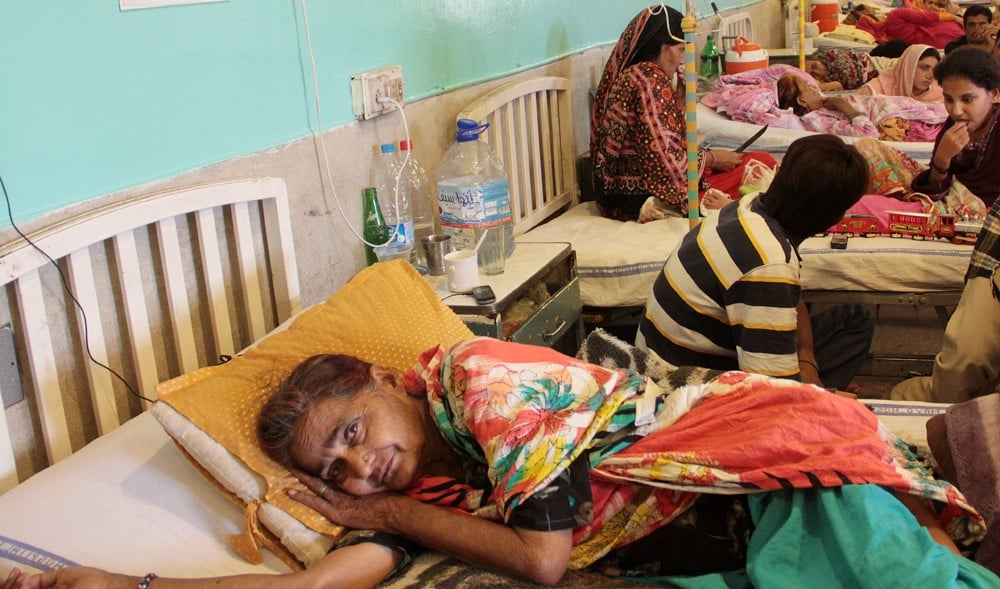
A cancer drug bank, set up recently by a group of oncologists, seeks to ensure availability of free medicines to the patients after they have taken the specialised treatment

The deadly disease of cancer is becoming more and more prevalent all over the world. In Pakistan, its incidence is on the rise, too, and advance-stage patients are in huge numbers. One reason for this increase is that the people do not go for diagnosis in time and, therefore, they aren’t treated while cancer is in its early stage. They go to the oncologist when their condition has deteriorated.
On the other hand, the cancer hospitals and wards in government hospitals do not admit patients who, according to their assessment, cannot recover. The poor patients are often inspected by oncologists in the outdoor wards and asked to go home and take prescribed medicines for as long as they live. While at home, they can’t be looked after properly. Sometimes, they are seen as a liability by their family members. As a result, the patients become isolated and, in many cases, depressed, having lost their self-esteem and finding it impossible to get back to normal life.
The situation gets even worse when these dejected souls are left to fend for themselves and they cannot bear the cost of treatment which, in any case, is very high. They have to run from pillar to post, getting verifications from government offices that they cannot afford expensive medicines, and obtaining attestations from local government representatives and zakat committees set up at different levels. All this can be too taxing for the patients who are already becoming frail and weak, both mentally and physically.
Fortunately, there are private individuals and organisations in the country that are working voluntarily for the treatment of the deserving cancer patients. They have set up hospitals, clinics, mobile cancer diagnostic laboratories, and so on. But the scale of this disease’s burden is so high that nothing is good enough and there is always the need for more help.
A group of doctors, mainly oncologists, recently joined hands with Dr Ehsanur Rehman, a UK-based cancer specialist of Pakistani origin, under the platform of Hubullah Welfare Society (HWS), to set up a cancer drug bank. The idea is to ensure availability of free cancer drugs to the patients after they have taken the specialised treatment required. These doctors have donated funds themselves and also asked other people to donate for the cause.
TNS spoke with Dr Rehman, President, HWS, at a fund-raiser orgainsed by the society in Lahore last week. He admitted that it was "a huge challenge, to try and cover the cost of cancer drugs. Many patients who underwent chemotherapy can’t afford the medicines they need during the process. So, this is the space we are trying to fill."
He said that the team was hopeful that "our regular patrons and donors, and also those who are joining us on a regular basis shall donate generously to the cause.
"It’s a pity that a cancer patient is treated as a subject but hardly anybody tries to find out what trauma he goes through. There is a need to treat such people psychologically as well."
Hence, the HWS offers counselling to cancer patients, and gives them vocational training so that they can find livelihood once their state improves. In some cases, they even help the female patients find suitable match. "The common perception when marrying a cancer survivor is that the disease can recur anytime. We are out to change that.
"What’s more, a person with a history of the disease is considered unfit for most jobs. Besides, people are scared of coming into contact with them, as if it’s contagious."
According to Dr Rehman, the cancer drug bank registers patients, and their doctors are required to fill a couple of forms and tell them about the treatment required, the frequency of medication, the number of cycles of chemotherapy needed, etc. "There is going to be special focus on transparency and maintaining the dignity of patients who will not have to declare their poverty and provide proofs in support. The oncologists’ declarations shall be enough."
The advisory board of HWS includes Dr Ahsan Waris, as patron-in-chief; Prof Dr Khalid Shabbir, former head of Oncology Department, Sheikh Zayed Hospital, Rahim Yar Khan; Dr Rizwan Sheikh, Consultant/Oncologist (Ireland); and Dr Adnan Masood, Consultant/Haematologist, King Fahad Medical City, Riyadh, Saudi Arabia.
Talking on the occasion, Dr Waris, Patron-in-Chief, HWS, spoke of special software that had been developed for the purpose." The donors and patients shall be given codes with the help of which they can keep track of each and every penny they have donated and the amount spent on their treatment."